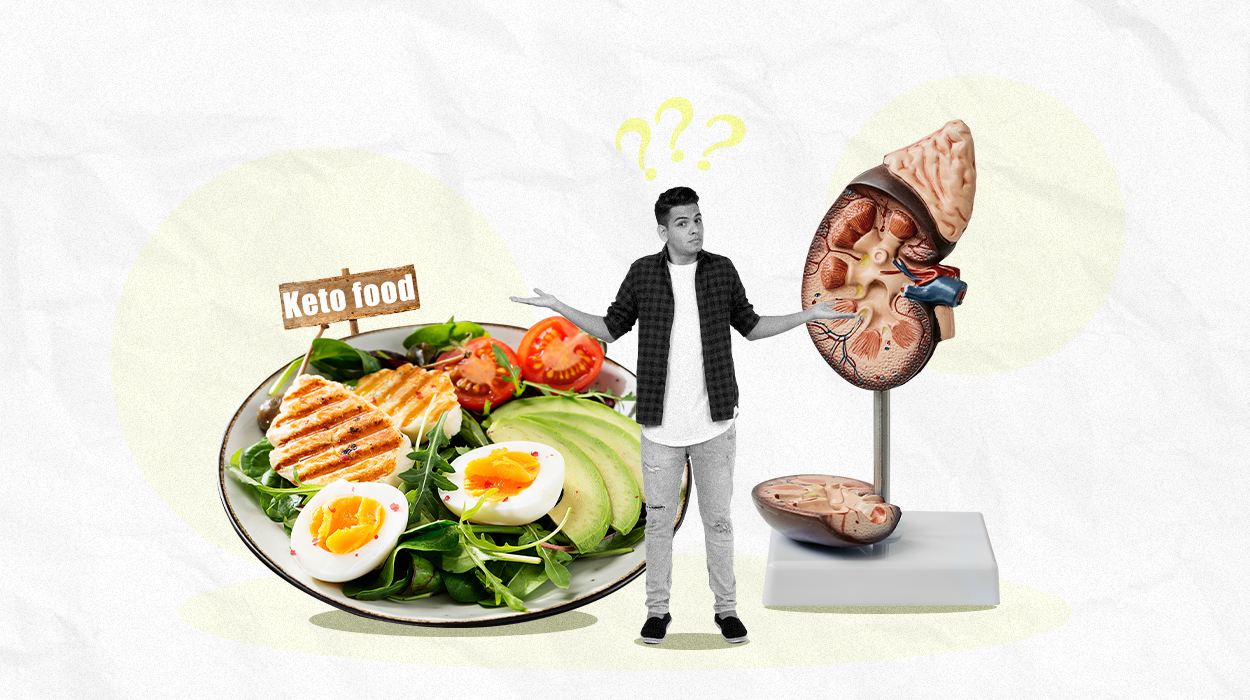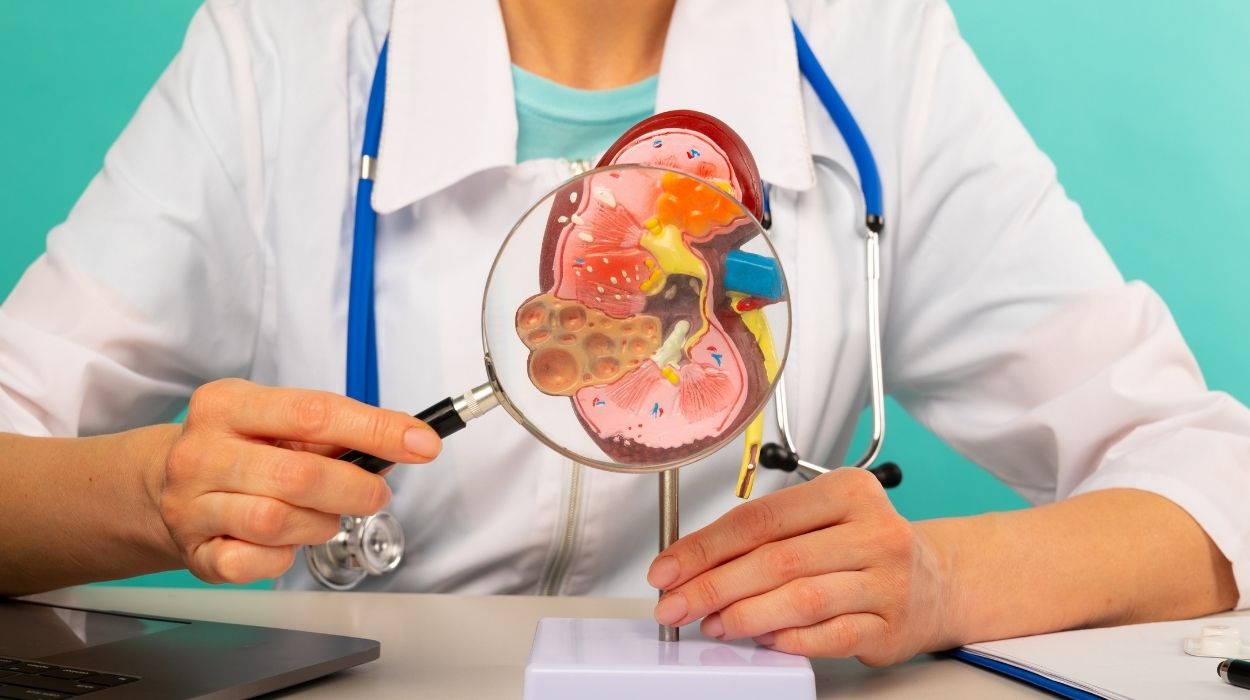 Expert's opinion
Expert's opinion
Expert's opinion
The article is a subjective view on this topic written by writers specializing in medical writing.
It may reflect on a personal journey surrounding struggles with an illness or medical condition, involve product comparisons, diet considerations, or other health-related opinions.
Although the view is entirely that of the writer, it is based on academic experiences and scientific research they have conducted; it is fact-checked by a team of degreed medical experts, and validated by sources attached to the article.
The numbers in parenthesis (1,2,3) will take you to clickable links to related scientific papers.
Keto And Kidney Stones: Can Keto Cause Kidney Stones 2024?

Kidney stones can be a painful and troublesome condition, and if you’re following a ketogenic diet, you might be wondering if it increases your risk of developing kidney stones.
The ketogenic diet can be an effective weight loss strategy, but it requires awareness and precautions to minimize the risk of kidney stones. By following these tips, you can navigate the keto diet with confidence and prioritize your kidney health.
In this article, we explore the connection between the keto diet and kidney stones to help you understand the factors involved and provide tips to minimize the risk. Keep reading to find out more!
Keto Diet And Kidney Stones
To minimize the risk of developing kidney stones while on a ketogenic diet, it is important to follow these tips:
- Stay hydrated
- Stick to a moderate protein intake
- Include calcium-rich foods
- Watch Oxalate intake
- Consume citrus fruits
- Consider supplementation
Tips To Avoid Kidney Stones On Keto

If you’re following a ketogenic diet (keto diet) and want to minimize the risk of developing kidney stones, here are some tips to consider:
Stay Hydrated
Drink plenty of water throughout the day to ensure adequate urine production and dilution. Read all about how much water you should drink per day here!
Moderate Protein Intake
While the keto diet emphasizes higher fat consumption, it also includes moderate protein intake. Excessive protein can increase the excretion of calcium in the urine, potentially contributing to stone formation, including uric acid stones (most prevalent kidney stones).
Include Calcium-Rich Foods
Although some dairy products are restricted on the keto diet due to their carbohydrate content, it’s important to incorporate non-dairy calcium sources. Foods like leafy greens (spinach, kale), almonds, broccoli, and sardines are good options. Calcium binds with oxalate in the intestines, reducing its absorption and decreasing the risk of stone formation.
Watch Oxalate Intake
Some keto-friendly foods are high in oxalate,[1] such as spinach, rhubarb, and almonds. While these foods can still be consumed in moderation, be mindful of portion sizes to minimize oxalate intake.
Consume Citrus Fruits
Citrus fruits like lemons and oranges contain citrate,[2] which can help prevent kidney stones by inhibiting the formation of crystals. Squeeze fresh lemon juice into your water or use it as a flavor enhancer for meals.
Consider Supplementation
If it’s challenging to meet calcium and other nutrient requirements through diet alone, discuss the possibility of supplementation with a healthcare professional or registered dietitian. Click here to learn more about KaraMD pure nature review supplements that can be beneficial for a ketogenic diet!
Why Does Keto Cause Kidney Stones?

Lack Of Calcium On Keto Diets
One of the reasons behind the connection between the ketogenic diet (keto diet) and kidney stones is the potential lack of calcium in the diet. Calcium is not only involved with bone health but kidney health and electrolyte balance. The keto diet is typically low in calcium-rich foods such as dairy products, as these contain carbohydrates. Calcium is essential for maintaining healthy bones and teeth, as well as preventing the formation of kidney stones.
When calcium levels[3] are inadequate, oxalate (a substance found in certain foods) can bind to calcium and form crystals in the kidneys, leading to kidney stone development. Additionally, the absence of dietary calcium can increase the absorption of oxalate from the intestines, further contributing to stone formation.
The ketogenic diets and other types of low-carb diets often restrict foods that are high in potassium, such as fruits, legumes, and certain vegetables, due to their carbohydrate content. Potassium plays a crucial role in maintaining proper kidney function and preventing the formation of kidney stones.
When potassium levels[4] are insufficient, it can lead to increased calcium excretion in the urine, which contributes to the development of calcium oxalate stones. Additionally, inadequate potassium levels can disrupt the balance of other minerals in the body, further increasing the risk of stone formation. Read all about foods high in potassium!
Moreover, ketosis, the metabolic state induced by the keto diet, can lead to a higher excretion of calcium in the urine. This increased urinary calcium concentration can increase the risk of calcium oxalate stone formation.
To mitigate the risk of kidney stones on a ketogenic diet consumption of foods, it is important to ensure an adequate intake of calcium. Non-dairy sources of calcium, such as leafy greens (spinach, kale), broccoli, almonds, and sardines, can be incorporated into the diet. Furthermore, staying well-hydrated is crucial to maintaining urine dilution and reducing the concentration of stone-forming substances.
It is essential to note that while the connection between the keto diet and kidney stones exists, not everyone who follows a keto diet will develop kidney stones.
Lack Of Fruits And Vegetables On Keto Diets
Another reason behind the connection between the ketogenic diet (keto diet) and kidney stones is the potential lack of fruits and vegetables in the diet. The keto diet restricts carbohydrate intake, which often leads to a reduced consumption of fruits and certain vegetables due to their higher carbohydrate content.
Fruits and vegetables are excellent sources of essential nutrients, including vitamins, minerals, and fiber. They also contain compounds that promote urinary health, such as citrate, which helps prevent the formation of kidney stones. Inadequate intake of these foods on a keto diet can lead to nutrient deficiencies and an imbalance in the body.
Additionally, fruits and vegetables are rich in water content, which helps maintain proper hydration and urine dilution. Insufficient hydration and concentrated urine increase the risk of stone formation.
To address this concern, individuals following a keto diet should prioritize low-carbohydrate fruits and vegetables, such as leafy greens, berries, cauliflower, and zucchini. These options provide essential nutrients and contribute to overall health while aligning with the principles of a ketogenic eating pattern.
It is crucial to strike a balance between the goals of the keto diet and the importance of including nutrient-dense fruits and vegetables. Seeking guidance from a healthcare professional or registered dietitian can help ensure a well-rounded and balanced approach to your dietary choices.
Lack Of Alkaline Foods
One of the reasons behind the connection between the ketogenic diet (keto diet) and kidney stones is the potential lack of alkaline foods in the diet. Alkaline foods[5] are those that have a higher pH level, helping to neutralize acid in the body.
On the keto diet, there is often an emphasis on consuming high-fat, low-carbohydrate foods, which can be acidic. Insufficient intake of alkaline foods, such as fruits and vegetables, may disrupt the acid-base balance in the body, potentially contributing to the formation of kidney stones. Including alkaline foods can help maintain a more optimal pH balance and reduce the risk of stone formation.
Keto Diet: Things You Need To Know
The ketogenic diet, commonly known as the keto diet,[6] is a low-carbohydrate, high-fat diet commonly known for its potential weight loss benefits and its effect on blood sugar control. If you are considering trying the keto diet, there are a few key things you need to know.
Firstly, the main principle of the keto diet is to drastically reduce your carbohydrate intake and replace it with fats. This shift in macronutrient ratios puts your body in a state of ketosis, where it starts to burn stored fat for energy instead of relying on carbohydrates. To achieve this, you need to consume foods rich in healthy fats, such as avocados, nuts, seeds, and oils, while limiting your intake of carbohydrates from sources like grains, starchy vegetables, and sugary foods.
Secondly, it’s important to understand that the keto diet is a highly restrictive eating plan. It requires careful planning and tracking of your food intake to ensure you’re staying within the desired macronutrient ratios. This can be challenging and may require adjustments to your lifestyle and social activities. To learn more about the general guidelines for the ketogenic diet click here!
Additionally, the keto diet may cause side effects[7] during the initial transition phase. These can include fatigue, dizziness, irritability, and brain fog, often referred to as the “keto flu.” These symptoms are temporary and usually subside within a few days to a couple of weeks as your body adapts to using fat as its primary fuel source.
Furthermore, the keto diet is certainly not suitable for everyone. People with medical concerns like pancreatitis or chronic kidney disease are advised to avoid this diet. It’s essential to consult with a healthcare professional or registered dietitian before starting the keto diet, especially if you have any underlying health concerns or take medications that could be affected by the diet.
Is The Ketogenic Diet Healthy?
While the ketogenic diet has been lauded by some for its potential weight loss benefits and its ability to control blood sugar levels, the question of whether the ketogenic diet is healthy remains a topic of debate among health professionals.
Proponents of the ketogenic diet argue that it can lead to rapid weight loss and improved insulin sensitivity, making it beneficial for individuals with conditions such as obesity or type 2 diabetes. They claim that by severely restricting carbohydrate intake and relying on fats for fuel, the body enters a state of ketosis, where it burns stored fat for energy.
However, critics of the ketogenic diet raise concerns about its potential long-term effects. They point out that the diet severely limits the intake of fruits, vegetables, whole grains, and legumes, which are all important sources of essential vitamins, minerals, and fiber. Such restrictions may result in nutritional deficiencies and an increased risk of chronic diseases like cardiovascular disease and certain types of cancer.
Ultimately, the question of whether the ketogenic diet is healthy depends on various factors, including individual health goals, medical conditions, and overall dietary patterns. It is crucial to consult with a healthcare professional or registered dietitian before embarking on any restrictive diet to ensure that it is suitable and sustainable for one’s specific needs.
Eat A Healthy Diet To Support Kidney Stone Prevention
- Stay away from foods and drinks with a lot of added sugar
- Stay hydrated
- Limit sodium intake: check out low-sodium meal delivery options
- Moderate animal protein consumption
- Watch oxalate-rich foods
- Maintain a healthy weight
- Get enough calcium
Conclusion
In conclusion, while following a ketogenic diet may increase the risk of developing kidney stones, there are several steps you can take to minimize this risk. Staying hydrated, moderating protein intake, including calcium-rich foods, watching oxalate intake, consuming citrus fruits, and considering supplementation are all important strategies to mitigate the potential negative effects of the keto diet on kidney health.
It’s crucial to strike a balance between the goals of the keto diet and maintaining overall health, including the inclusion of nutrient-dense fruits and vegetables. Consulting with a healthcare professional or registered dietitian is recommended, especially for individuals with a history of kidney stones or other kidney-related conditions.
+ 7 sources
Health Canal avoids using tertiary references. We have strict sourcing guidelines and rely on peer-reviewed studies, academic researches from medical associations and institutions. To ensure the accuracy of articles in Health Canal, you can read more about the editorial process here
- Zhu, W., Zhang, Y., Zhang, J., Deng, Q. and Liang, H. (2021). Recent advances on the mechanisms of kidney stone formation (Review). International Journal of Molecular Medicine, [online] 48(2). doi:https://doi.org/10.3892/ijmm.2021.4982.
- Caudarella, R., Fabio Vescini, Buffa, A. and S Stefoni (2003). Citrate and mineral metabolism kidney stones and bone disease. Frontiers in Bioscience, [online] 8(6), pp.s1084-1106. doi:https://doi.org/10.2741/1119.
- Khan, S.R., Pearle, M.S., Robertson, W., Gambaro, G., Canales, B.K., Steeve Doizi, Olivier Traxer and Hans‐Göran Tiselius (2016). Kidney stones. Nature Reviews Disease Primers, [online] 2(1). doi:https://doi.org/10.1038/nrdp.2016.8.
- Api Chewcharat, Charat Thongprayoon, Vaughan, L.E., Mehta, R.A., Schulte, P.J., O’Connor, H.M., Lieske, J.C., Taylor, E.N. and Rule, A.D. (2022). Dietary Risk Factors for Incident and Recurrent Symptomatic Kidney Stones. Mayo Clinic Proceedings, [online] 97(8), pp.1437–1448. doi:https://doi.org/10.1016/j.mayocp.2022.04.016.
- Bahrami, H. and Greiner, T. (2021). The Alkaline Diet and the Warburg Effect. [online] ResearchGate. Available at: https://www.researchgate.net/publication/350547797_The_Alkaline_Diet_and_the_Warburg_Effect.
- Swink (2023). The ketogenic diet: 1997. Advances in pediatrics, [online] 44. Available at: https://pubmed.ncbi.nlm.nih.gov/9265974/.
- Masood, W., Pavan Annamaraju, Khan, Z. and Uppaluri, K.R. (2023). Ketogenic Diet. [online] Nih.gov. Available at: https://www.ncbi.nlm.nih.gov/books/NBK499830/



